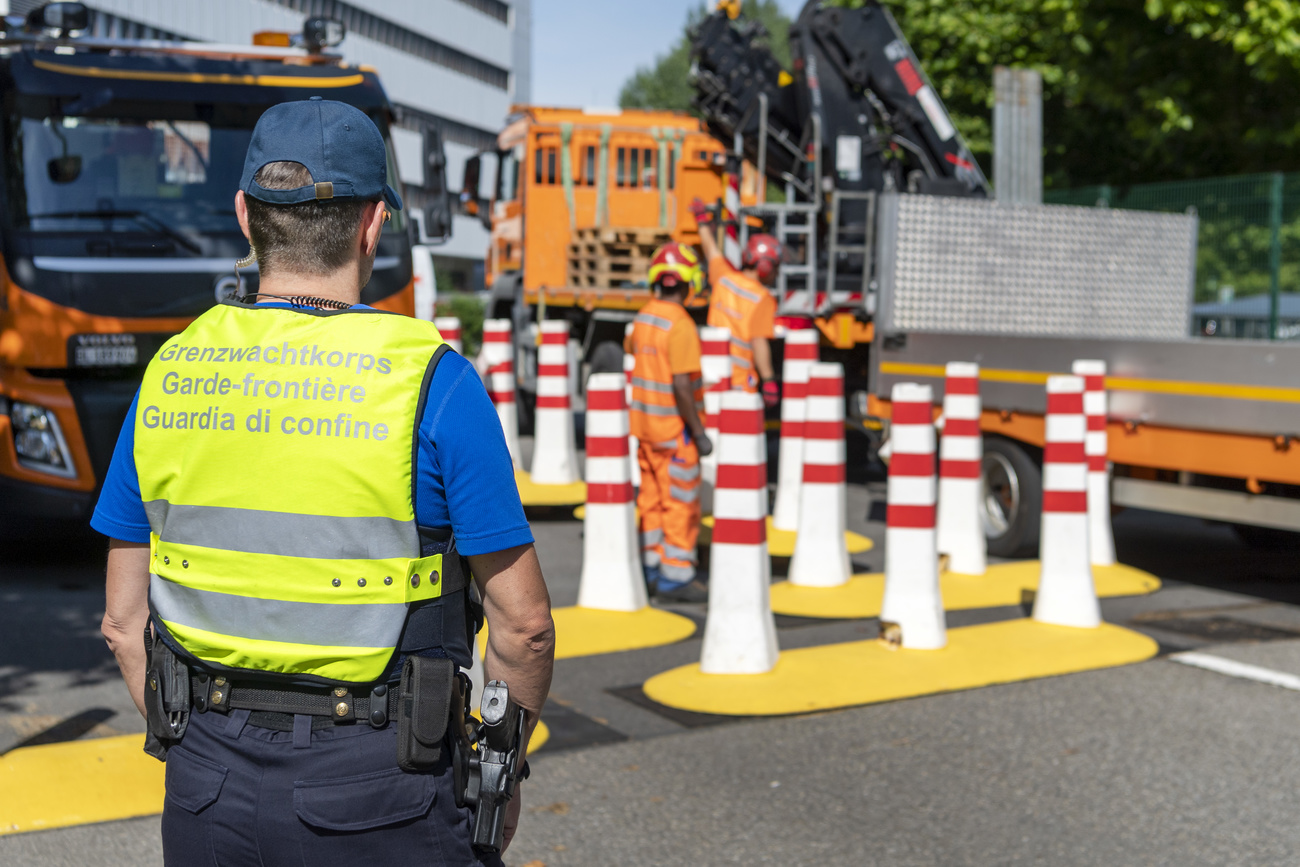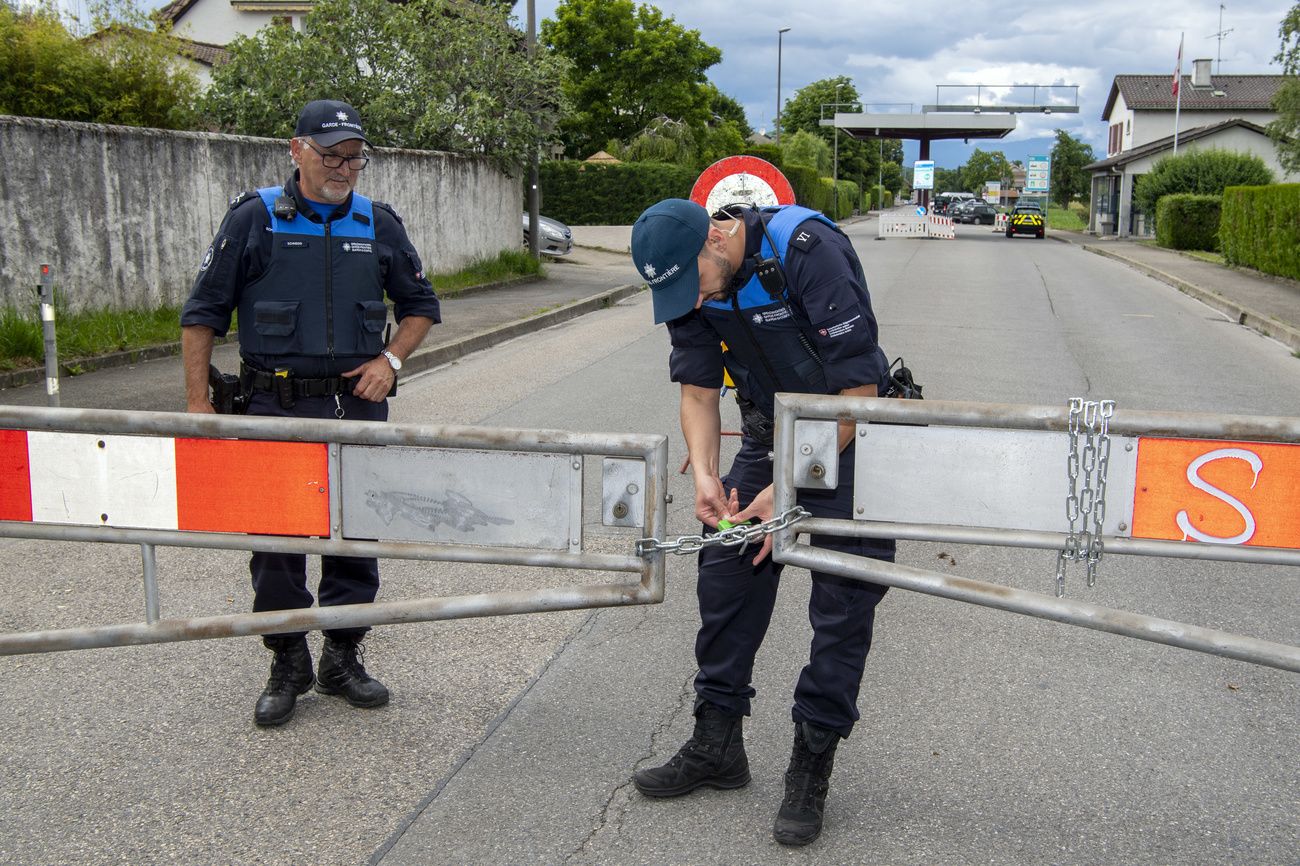
Re-opening of European borders generates mixed reactions

The lifting of travel restrictions in Europe was greeted by celebrations in some Swiss towns and trepidation in others.
On Monday morning the gates re-opened in border towns across Switzerland around three months after entry restrictions were put in place to prevent the spread of Covid-19. During the period of semi-confinement, border crossings were reduced by 60-70%.
In an interview with Swiss public television SRF on Monday morning, Swiss Justice Minister Karin Keller-Sutter said a fundamental right had been restored to citizens: the freedom to travel. But she stressed that this doesn’t mean the end of the pandemic.
Near Basel in north-western Switzerland, representatives of the Swiss, French and German authorities celebrated the re-opening of the borders on Monday morning on the Tri-Country Bridge over the Rhine River. They stressed the importance of cross-border cooperation to prevent further closures of this kind in the future.
Applause and cheers also marked the removal of the last barrier around Lake Constance, on the border with Germany. Representatives on both sides cut the wires connecting the fences and then met between the two barriers, each carrying a bottle of wine to toast together.
Shops and restaurants in Constance – a popular destination for Swiss cross-border shoppers – were not taken by storm on Monday, but streets were reportedly busier than a typical Monday morning.
The Federal Customs Administration reported that border crossings were heavily used on Monday morning, particularly the motorway between Switzerland and Germany at Rheinfelden.
In Italian-speaking canton Ticino in the south of the country, the border opening was greeted with more anxiety. As reportedExternal link by SRF, some people in the region felt it was too early to open the border while others saw it as a step towards normalisation. According to reports, it was relatively quiet at the crossings in Chiasso in Ticino on Monday morning.
It will take some adapting to different country requirements, in particular the wearing of masks, which is obligatory on public transport and in shops in some neighbouring countries and cities.

More
Switzerland re-opens its European borders
Air travel
Some 2,500 passengers arrived at Geneva Airport and around 15 flights were planned for departure to various cities around Europe. Passengers were greeted at the airport by employees who handed out protective masks and small chocolates.
André Schneider, director of Geneva Airport, told Keystone-SDA news agency that it would likely take 2-3 years to return to last year’s passenger levels. At this time of year, the daily number of passengers normally fluctuates between 40,000 and 60,000 a day.
The Federal Office of Public Health announced on Monday that it is taking special safety precautions for travellers coming from countries with high rates of infection. On Monday, all passengers on direct flights from Sweden to Switzerland were checked for a fever.
A spokesperson for the public health office told Keystone-SDA that no one had a fever on the first direct flight from Sweden on Monday. Sweden is for the time being the only country affected with the additional health safety measure.
Army departure
The re-opening of the borders on Monday also marked the end of the Swiss army presence along the borders.
On Sunday evening, 630 army officers completed their duties, the army said. The officers had been supporting the Federal Customs Administration on the borders with France in cantons Geneva and Jura as well as the Basel region since May 27.
More than 700 officers had originally been deployed to monitor the borders but following the easing of restrictions with Germany and Austria at the end of May, customs no longer required support on the northern and eastern borders.
An official handover of the flag took place on Mondreay evening in the presence of lieutenant general Aldo Schellenberg, the head of the “Corona 20” operations. The officers will be officially released from their duties on Wednesday morning.
The contingent was part of the largest mobilisation of the Swiss army in 80 years. Up to 5,000 troops were on duty notably for logistics services in hospitals and nursing homes.

In compliance with the JTI standards
More: SWI swissinfo.ch certified by the Journalism Trust Initiative






























You can find an overview of ongoing debates with our journalists here . Please join us!
If you want to start a conversation about a topic raised in this article or want to report factual errors, email us at english@swissinfo.ch.